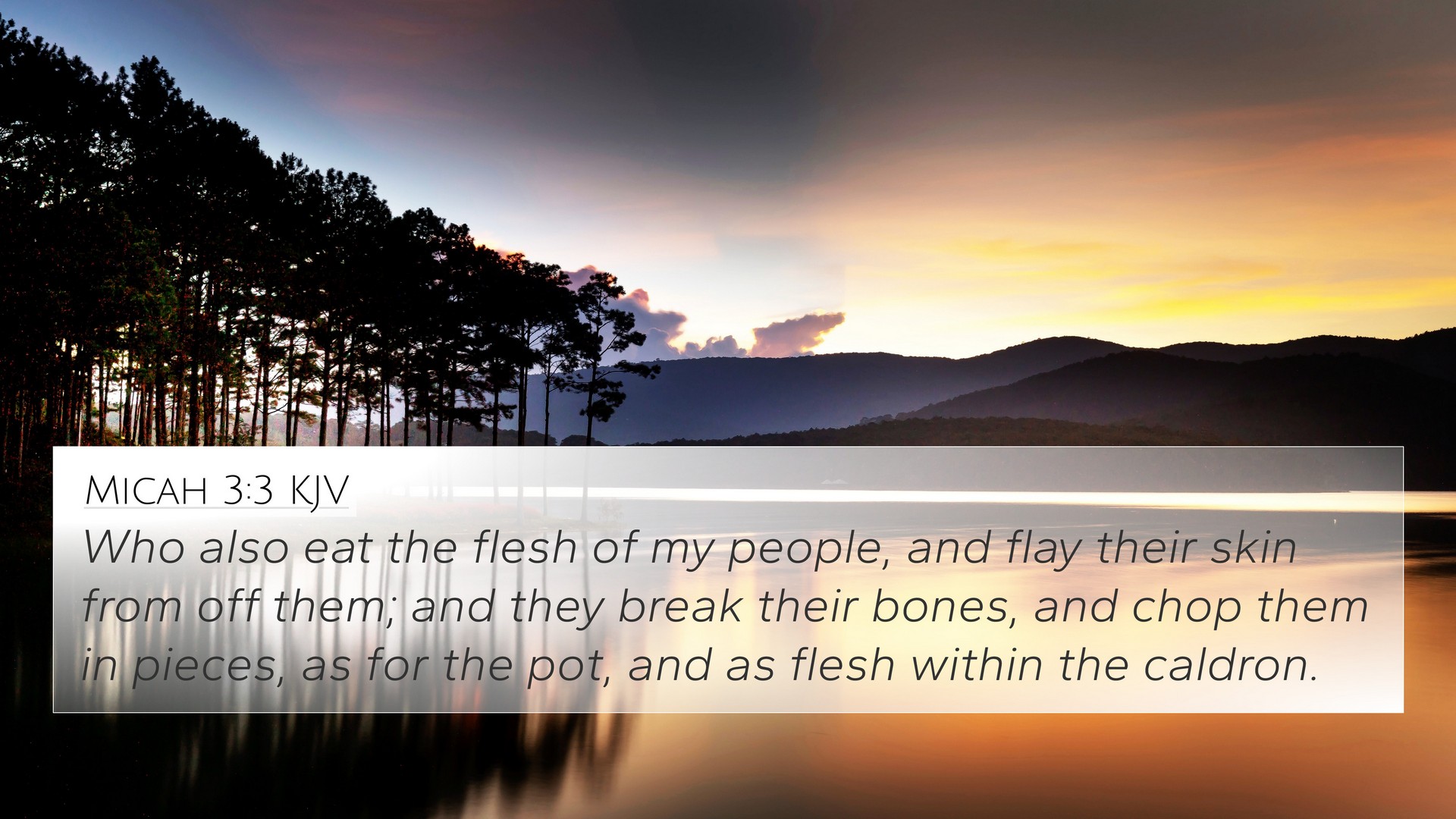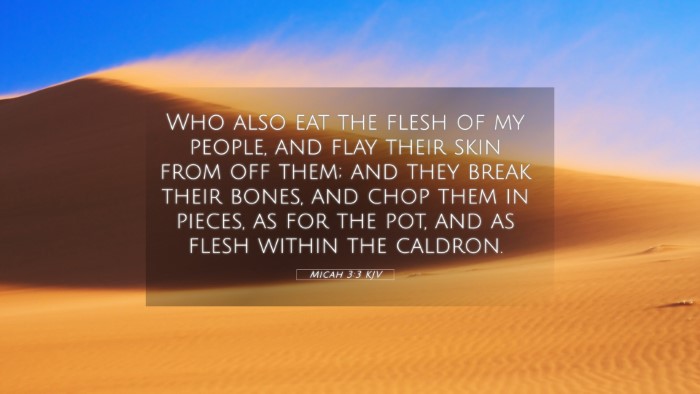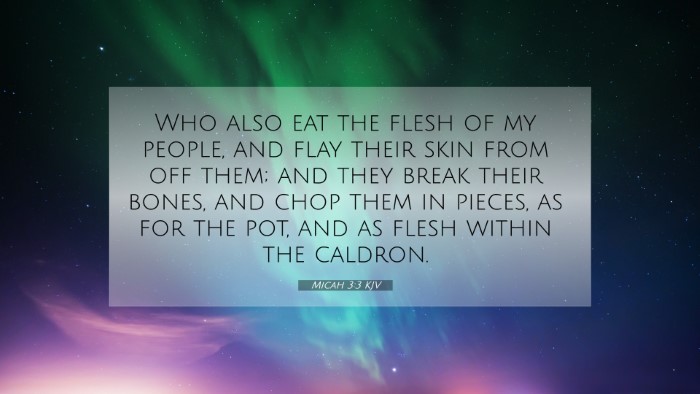Old Testament
Genesis Exodus Leviticus Numbers Deuteronomy Joshua Judges Ruth 1 Samuel 2 Samuel 1 Kings 2 Kings 1 Chronicles 2 Chronicles Ezra Nehemiah Esther Job Psalms Proverbs Ecclesiastes Song of Solomon Isaiah Jeremiah Lamentations Ezekiel Daniel Hosea Joel Amos Obadiah Jonah Micah Nahum Habakkuk Zephaniah Haggai Zechariah MalachiMicah 3:3 Similar Verses
Micah 3:3 Cross References
Who also eat the flesh of my people, and flay their skin from off them; and they break their bones, and chop them in pieces, as for the pot, and as flesh within the caldron.
Uncover the Rich Themes and Topics of This Bible Verse
Listed below are the Bible themes associated with Micah 3:3. We invite you to explore each theme to gain deeper insights into the Scriptures.
Micah 3:3 Cross Reference Verses
This section features a detailed cross-reference designed to enrich your understanding of the Scriptures. Below, you will find carefully selected verses that echo the themes and teachings related to Micah 3:3 KJV. Click on any image to explore detailed analyses of related Bible verses and uncover deeper theological insights.
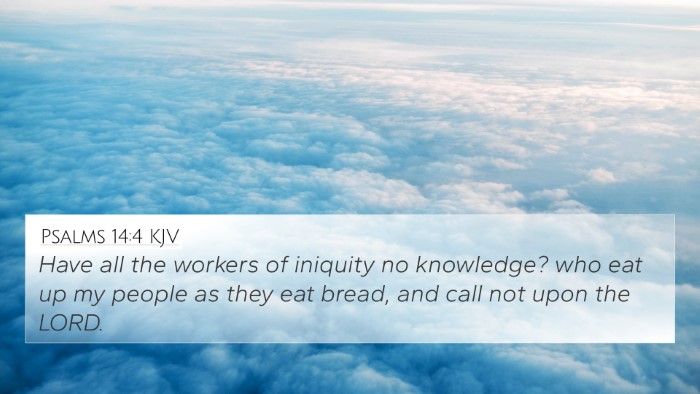
Psalms 14:4 (KJV) »
Have all the workers of iniquity no knowledge? who eat up my people as they eat bread, and call not upon the LORD.

Ezekiel 11:3 (KJV) »
Which say, It is not near; let us build houses: this city is the caldron, and we be the flesh.

Ezekiel 11:6 (KJV) »
Ye have multiplied your slain in this city, and ye have filled the streets thereof with the slain.
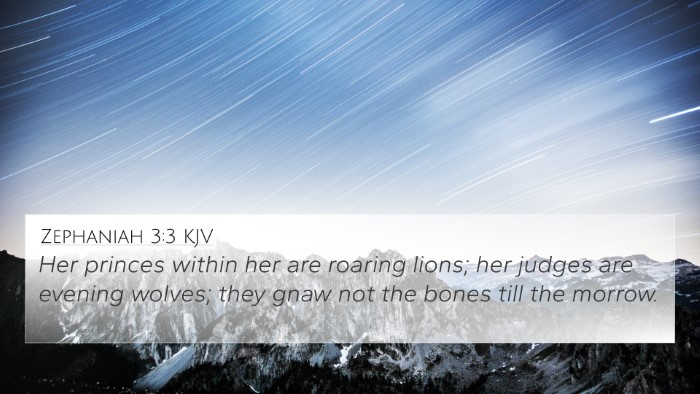
Zephaniah 3:3 (KJV) »
Her princes within her are roaring lions; her judges are evening wolves; they gnaw not the bones till the morrow.
Micah 3:3 Verse Analysis and Similar Verses
Meaning and Interpretation of Micah 3:3
Micah 3:3: “Who also eat the flesh of my people, and flay their skin from off them; and they break their bones, and chop them in pieces as for the pot, and as flesh within the caldron.”
This verse from Micah speaks to the severe moral corruption and exploitation prevalent among the leaders of Israel during the time of the prophet. The metaphorical language used here paints a vivid picture of the violence and depravity with which these leaders treated the people they were supposed to protect.
Key Themes in Micah 3:3
- Corruption of Leadership: Highlighting how leaders exploit the vulnerable rather than serve them.
- Divine Judgment: Unveiling the consequences that will befall those who fail to act righteously.
- Metaphor of Cannibalism: Illustrating the intense and twisted nature of their exploitation.
- Social Injustice: A call for justice and righteousness that reflects God's desire for His people.
Commentary Insights
Matthew Henry: Matthew Henry interprets this verse as a stark condemnation of the greed and cruelty exhibited by the leaders, likening their actions to cannibalism. He suggests that leaders consume the very essence of their people for their own gain, leading to moral and spiritual decay.
Albert Barnes: Barnes emphasizes that the imagery used is meant to shock the audience into recognizing the extent of their leaders' sins. He points out the gruesome nature of their actions, which signifies treachery against the covenant community of Israel.
Adam Clarke: Clarke discusses how this verse encapsulates the core issue of social injustice and highlights God's disdain for those who exploit the weak. He underscores that such sins lead to dire consequences, both for the leaders and for the nation.
Cross-References for Micah 3:3
- Isaiah 3:14-15: A similar rebuke of unjust leaders judged with severity for their treatment of the poor.
- Jeremiah 22:13-17: An indictment against those who build their houses and fail to care for justice and righteousness.
- Ezekiel 34:2-4: The Lord's condemnation of shepherds who feed themselves while neglecting their flocks.
- Zechariah 11:4-5: A reference to the destruction of those who devour the flock for their own gain.
- Matthew 23:27-28: Jesus condemns the Pharisees and scribes, likening them to whitewashed tombs, outwardly beautiful but inwardly full of corruption.
- James 5:1-6: A warning to the rich and exploitative, affirming that their wealth gained through oppression will lead to misery.
- Lamentations 3:34-36: God's justice against those who oppress and distort justice.
- Micah 3:1-2: Prior verses that set the tone for God’s complaint against the leaders.
- Proverbs 28:16: A ruler lacking understanding will be cruel, highlighting the importance of righteous leadership.
- Luke 3:14: John the Baptist’s admonition to soldiers to be content with their wages serves as a call for justice and moral behavior.
Significance of Cross-Referencing Biblical Texts
Cross-referencing biblical texts is crucial for gaining deeper insights into biblical themes and messages. By linking Bible scriptures, one can uncover the rich tapestry of God's word and its relevance across both Old and New Testament narratives.
Tools for Bible cross-referencing, such as a Bible concordance or a specific cross-reference guide, aid believers in identifying connections and enhancing their study. This practice not only strengthens understanding but also helps in recognizing how different verses and passages interact with each other.
Practical Application
In applying the lessons from Micah 3:3, it is vital to reflect on our roles as leaders or influencers in our communities. The verse serves as a reminder of the responsibilities that come with such roles and the serious implications of failing to uphold justice and righteousness.
Studying the connections between this verse and related texts can lead to a comprehensive understanding of God’s expectations for leaders and the consequences of injustice. For individuals looking to cultivate a life aligned with biblical teachings, engaging in a cross-reference Bible study can be invaluable.
Conclusion
Micah 3:3 serves as a profound warning against the exploitation of the vulnerable by leaders who are meant to protect them. Through the insights of public domain commentaries along with relevant cross references, one can appreciate the depth of God's justice and the serious call for accountability among those in positions of power.
By exploring the interconnectedness of Scripture, we can better understand the overarching narrative of God's desire for justice and righteousness, reminding us of our call to live out these principles in our own lives.
